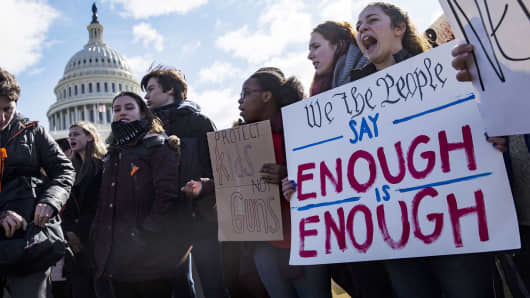It would behoove politicians from both major parties to take note.
David Schultz, a professor of political science at Minnesota's Hamline University and the author of, American Politics in the Age of Ignorance, echoed Stillman's assessment of Generation Z.
"This is the 'Do-It-Yourself Generation,'" says Schultz who has studied and written about the impacts of generational politics in America. "All of our research indicates that Generation Z will be much more active in exacting change with or without the help of the political establishment. This Saturday's march has the gun control debate in its crosshairs, representing a coming of political age for Generation Z. But a year from now, it could be healthcare, the environment, or any number of other issues."
According to a recent survey commissioned by Northeastern University, only 3% of GenZers view political leaders as role models. And although less than a third of these estimated 78 million Americans will be old enough to vote in this year's midterms, a politically engaged generation that has little to no tolerance for the semantically empty "thoughts and prayers" refrain has the potential to upend the traditional political establishment.
As Americans tune into live coverage of Saturday's expansive march on Washington, they should be mindful of what they are really watching: the awakening of an entirely new generation of voices - a generation that is just beginning to flex its political muscle. Generation Zers will expect their leaders to bring about change at a pace more in line with those who grew up in an all-digital environment, and one that will certainly challenge the pace of change as rendered by the Washington establishment.
The clash between Generation Z and Washington politicians is a drama that will unfold over the next several election cycles, with the narrative arc focusing on how long it takes the nation's major parties to respond to the demands of an emerging political class which will be supplying a fresh batch of several million new voters to the electorate every year between now and 2030. The first chapter in this epic saga begins this Saturday.
Commentary by Arick Wierson, a six-time Emmy Award-winning television executive and former deputy commissioner under New York City Mayor Michael Bloomberg. Currently, Wierson works as a political and branding consultant to clients in the United States, Africa and Latin America. He is currently advising candidates in U.S. House races in Southern California, Michigan, Minnesota and Wisconsin as well as several state gubernatorial candidates in Brazil. You can follow him on twitter @ArickWierson.
For more insight from CNBC contributors, follow
@CNBCopinion
on Twitter.


